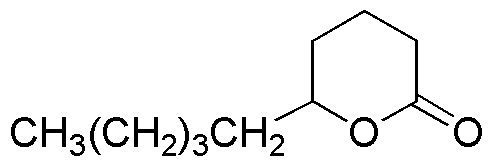d-Decalactone is widely utilized in research focused on
- Flavor and Fragrance Industry: This compound is commonly used as a flavoring agent in food products and as a fragrance in cosmetics due to its pleasant, creamy scent reminiscent of coconut. Its natural aroma enhances the sensory experience of various products.
- Pharmaceutical Applications: In the pharmaceutical sector, d-Decalactone serves as a building block in the synthesis of various medicinal compounds, contributing to the development of new drugs with improved efficacy and safety profiles.
- Polymer Production: It is utilized in the production of biodegradable polymers, which are gaining popularity due to their environmental benefits. These polymers can be used in packaging materials that reduce plastic waste.
- Cosmetic Formulations: The compound is incorporated into skincare and cosmetic products for its emollient properties, helping to improve skin texture and moisture retention, making it a valuable ingredient in lotions and creams.
- Aromatic Applications: d-Decalactone is also used in the formulation of candles and air fresheners, where its long-lasting scent provides a pleasant atmosphere in homes and commercial spaces.
General Information
Properties
Safety and Regulations
Applications
d-Decalactone is widely utilized in research focused on
- Flavor and Fragrance Industry: This compound is commonly used as a flavoring agent in food products and as a fragrance in cosmetics due to its pleasant, creamy scent reminiscent of coconut. Its natural aroma enhances the sensory experience of various products.
- Pharmaceutical Applications: In the pharmaceutical sector, d-Decalactone serves as a building block in the synthesis of various medicinal compounds, contributing to the development of new drugs with improved efficacy and safety profiles.
- Polymer Production: It is utilized in the production of biodegradable polymers, which are gaining popularity due to their environmental benefits. These polymers can be used in packaging materials that reduce plastic waste.
- Cosmetic Formulations: The compound is incorporated into skincare and cosmetic products for its emollient properties, helping to improve skin texture and moisture retention, making it a valuable ingredient in lotions and creams.
- Aromatic Applications: d-Decalactone is also used in the formulation of candles and air fresheners, where its long-lasting scent provides a pleasant atmosphere in homes and commercial spaces.
Documents
Safety Data Sheets (SDS)
The SDS provides comprehensive safety information on handling, storage, and disposal of the product.
Product Specification (PS)
The PS provides a comprehensive breakdown of the product’s properties, including chemical composition, physical state, purity, and storage requirements. It also details acceptable quality ranges and the product's intended applications.
Certificates of Analysis (COA)
Search for Certificates of Analysis (COA) by entering the products Lot Number. Lot and Batch Numbers can be found on a product’s label following the words ‘Lot’ or ‘Batch’.
*Catalog Number
*Lot Number
Certificates Of Origin (COO)
This COO confirms the country where the product was manufactured, and also details the materials and components used in it and whether it is derived from natural, synthetic, or other specific sources. This certificate may be required for customs, trade, and regulatory compliance.
*Catalog Number
*Lot Number
Safety Data Sheets (SDS)
The SDS provides comprehensive safety information on handling, storage, and disposal of the product.
DownloadProduct Specification (PS)
The PS provides a comprehensive breakdown of the product’s properties, including chemical composition, physical state, purity, and storage requirements. It also details acceptable quality ranges and the product's intended applications.
DownloadCertificates of Analysis (COA)
Search for Certificates of Analysis (COA) by entering the products Lot Number. Lot and Batch Numbers can be found on a product’s label following the words ‘Lot’ or ‘Batch’.
*Catalog Number
*Lot Number
Certificates Of Origin (COO)
This COO confirms the country where the product was manufactured, and also details the materials and components used in it and whether it is derived from natural, synthetic, or other specific sources. This certificate may be required for customs, trade, and regulatory compliance.

